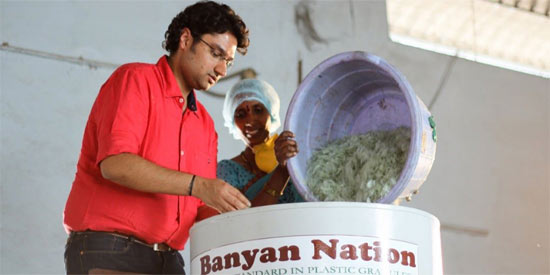
Banyan Nation emerges as the winner of the Intel & DST Innovate for Digital India Challenge 2.0

Driving the dual agenda of Swachh Bharat and Smart Cities, sustainable waste management startup, Banyan Sustainable Waste Management Pvt. Ltd. (“Banyan Nation”), incubated at T-Hub Foundation (“T-Hub”), has been announced as the grand winner of the Intel & DST Innovate for Digital India Challenge 2.0 (Challenge 2.0). The winning team has developed a zero-waste platform based on an Intel® Edison board for Arduino, Intel® IoT analytics platform and the Intel® powered Jan Unnati tablet, to streamline and automate urban recycling operations at every stage. Combining informatics and hardware engineering, Banyan Nation’s management system aims to root out bottlenecks in India’s recycling value chain.
To manage the 62 million tonnes of municipal waste generated annually in India, Banyan Nation has developed a modular system, customizable to the requirements of different municipalities and third-party system integrators. In its first pilot project, currently in its beta stage in Warangal, Telangana, it has deployed on-field bin sensors, GPS truck routers, landfill management toolkits and back-end visualization and analytic engines to monitor and synchronize waste management.
With the Ministry of Electronics and Information Technology’s (MeitY) recent proposal to integrate the Internet of Things (IoT) in waste management under the Smart City program, there is immense potential for sensor-enabled devices to transform waste disposal.
India has long prioritized waste management as a core development goal, and reforms such as the government’s legal mandate to segregate of waste at source, has raised civic consciousness about smart waste management. Identifying the role that hazardous waste plays in perpetuating India’s status quo and informal sector, the founders of Banyan Nation, Raj Madangopal and Mani Vajipey, entered Challenge 2.0 as part of this trend of citizen participation in cleaning and greening India.
“Today’s winners epitomize the philosophy of the Intel & DST – Innovate for Digital India Challenge 2.0, which is to build a fairer, more equitable India, by improving access to technology. As India forges ahead as a global innovator, harnessing citizen potential and ideation has become indispensable to releasing new services and solutions back into the Indian economy. This year, we expanded the scope of Challenge 2.0 by including the categories of smart city and sustainability, under which some of the most innovative solutions such as Banyan Nation have emerged. We look forward to the new heights our top teams will reach as they become role models and inspire other citizens to be the change in their communities”, said Prakash Mallya, Managing Director – Sales & Marketing Group, Intel Technology India Pvt. Ltd.
During the Challenge 2.0 accelerator, Banyan Nation also developed Better Plastic™, a high-grade plastic made from recycled material. By leveraging its platform that connects the demand for recycled plastic with its supply, Banyan Nation aims to formalize the recycling sector by closing the loop between industry and waste aggregators. Given that India Inc. generated 7.8 million tonnes of hazardous waste in 2015-16, the company foresees the application of Better Plastic™ for the product and packaging requirements for electronics, automobiles, pharmaceuticals, and FMCGs.
Challenge 2.0, the second edition of the Intel & DST – Innovate for Digital India Challenge, is a platform for end-to-end hardware product innovation that identifies and incubates homegrown entrepreneurial solutions that address India’s indigenous issues. This year, Intel India and Department of Science & Technology (“DST”) collaborated with T-Hub, India’s fastest growing startup engine catalyzing innovation, scale and deal flow, to identify ideas that could solve complex issues at the country’s grassroots level through technology and automation, accelerating the transition to a Digital India. Each solution is designed for scale, and to improve the quality of people’s lives in the remotest corners of India.
“With the government laying the pathway for Digital India, we are at the precipice of a truly transformative phase in development. As an essentially democratic force, we have witnessed the power of technology as it creates opportunities for marginalized communities and accelerates growth for the country as a whole. We are honoured to anchor Challenge 2.0 in collaboration with Intel, DST, MyGov and MeitY. In our experience, startups are keen to offer solutions that not only have business potential, but also those that disengage socio-economic orders that are at odds with inclusive development. This intensive programme, which has spanned over six months, has equipped the chosen start-ups with a global perspective to ensure that their game changing ideas translate to reality,” said Jay Krishnan, CEO, T-Hub.
From developing the Minimum Viable Product that allowed teams to collect maximum validated learning about their customers with the minimum effort, to go-to-market strategy, the Challenge 2.0 has helped participants take their prototypes from mind-to-market. Rounding off the top 3 winners were geriatric healthcare start-up AllizHealth and infant mortality incubator iNICU:
- AllizHealth is an assistive device based on the Intel® Curie module in the preventive healthcare technology space. It connects the user with a health management platform that assesses and anticipates health risks particularly related to geriatrics support. Providing an integrated, predictive algorithm, the wearable digitally connects users with various ecosystem partners and caregivers for alerts on falls and resulting support and condition management.
- iNICU & iCHR is helping reduce the neonatal infant mortality rate with a system that integrates real-time clinical data from connected devices within the laboratory with bedside observational data. Based on the Intel® Cybertan Gateway and Intel® Edison, the solution presents the information in medically comprehensive formats to reduce mortality in neonatal intensive care units (NICUs). It enables complex clinical decisions to be made in real-time by automatically collecting clinical data, providing critical care for preterm babies.
